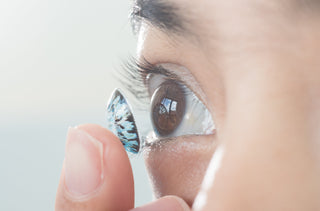Diplopia, also known as double vision, is a condition in which a person perceives two distinct images instead of one clear one. This can affect just one eye (monocular diplopia) or both eyes (binocular diplopia). The condition may be temporary or chronic and results from a variety of underlying causes.
Causes of diplopia
Diplopia can have many origins, ranging from benign refractive problems to serious conditions affecting the nervous system or eye muscles. Here are some of the most common causes:
- Refractive problems: Monocular diplopia, where the double image is visible even when one eye is closed, can be caused by abnormalities in the eye's refraction, such as uncorrected astigmatism, cataracts or irregularities in the cornea.
- Muscle dysfunction: Conditions such as strabismus can affect the eye muscles, which help coordinate eye movements. Strabismus prevents the eyes from aligning properly, leading to binocular diplopia, where the eyes are not aligned, creating double images.
- Neuropathies and neurological disorders: Conditions such as multiple sclerosis, stroke, brain tumours or neurodegenerative diseases can damage the nerves that control eye muscles, leading to eye movement disorders and diplopia.
- Trauma and injury: Accidents, head trauma or, orbital fractures can damage eye muscles or eyeball structures, resulting in double vision.
- Other medical causes: Conditions such as diabetes, thyroid disease (like Graves' disease), or myasthenia gravis can also affect the muscles and nerves responsible for eye coordination, causing episodes of diplopia.
Diplopia symptoms
The main symptom of diplopia is the perception of two superimposed or side-by-side images. Depending on the cause, symptoms may vary. The main signs include:
- Double vision: The two images may be parallel (horizontal diplopia) or vertically superimposed (vertical diplopia).
- Eye fatigue: Efforts to merge images or keep the eye aligned can lead to eye fatigue.
- Eye pain: Some causes of diplopia, such as infection or injury, may be accompanied by pain around the eyes.
- Intermittent or constant diplopia: Sometimes, double vision may appear intermittently and worsen with fatigue or eye movement.
Treatments for Diplopia
Treatment of diplopia depends on the disorder's underlying cause and severity. Here are the main therapeutic approaches:
- Correction of refractive problems: If diplopia is due to refractive problems, glasses or contact lenses can correct vision. In the case of cataracts, surgery may be required to restore clear vision.
- Eye exercises: For some forms of strabismus or muscle weakness, eye re-education exercises can help improve eye coordination and reduce double vision.
- Surgery: In cases of severe strabismus or muscle paralysis, surgery may be considered to realign the eyes or repair damaged eye muscles.
- Medical treatment: Medication may be required for diplopia related to neurological or systemic conditions. For example, treatments for diabetes, multiple sclerosis or thyroid disorders can improve vision.
- Prisms and special lenses: Prismatic lenses may be prescribed to help fuse images and relieve diplopia, particularly if the condition is muscular.
- Visual retraining: An Optometrist may sometimes recommend specific exercises to train the brain to merge images correctly, especially if diplopia is linked to eye coordination problems.
When should you consult an Optometrist?
If you are experiencing symptoms of diplopia, it is essential to consult an Optometrist as soon as possible to determine the cause and obtain appropriate treatment. If diplopia is accompanied by sudden vision loss, severe headaches, or difficulty speaking or moving, this is a medical emergency, and immediate evaluation is necessary.
Diplopia is a disruptive visual condition with many causes, ranging from benign problems to more serious ones. Early diagnosis and a tailored therapeutic approach are key to treating diplopia effectively. If you suffer from double vision, don't hesitate to consult an optometrist for personalized care.





















































